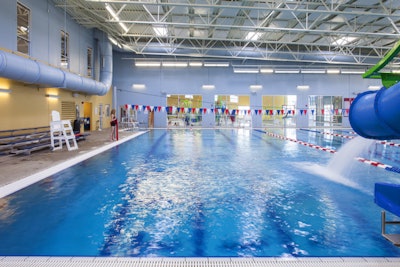
This story originally appeared in Florida Pool Pro, July 2020.
Until the last few years, heating systems traditionally relied on a mechanical bypass valve, located on the swimming pool return line, in order to supply heaters with the precise amount of water required. Too little flow, you’ll scale up, warp and literally destroy your heaters. Too much flow, you’ll lose efficiency which can erode heat exchange systems. There have been two main issues with this system, which is why most facilities have upgraded to a dedicated booster pump. Is this upgrade for you? Read on!
Problem #1:
Keeping the right flow. Heater flow varies with filter and strainer soiling, and where you set the valve. Even a small change in the filter soiling or valve setting, causes a larger variation in the flow diverted to the heater. You’ll need to continually babysit the flow to the heaters as the filters get dirty and adjust the bypass valve to arrive at the proper flow. This can be a pain, and many heater service calls and service issues are caused by lack of proper flow.
Problem #2:
No heating during savings mode. Florida DOH code allows pools to turn down the filtration rate three hours after closing as long as they ramp back up to three hours before opening. Many CES customers have taken advantage of this as they can turn down to 30 Hz, thus operating at 12.5% of normal power, while still circulating, filtering, and chlorinating. However, a mechanical heater bypass will no longer send the right amount of water to the heating system, therefore the customer either foregoes saving money, which is not acceptable to many, or lets the heater go into alarm mode whenever they attempt to save energy.
The Solution
Many hundreds of customers have found a solution by installing a small heater booster pump. A simple booster pump can pull and return the precise flow rate to the heating system 24/7 regardless of the filter soiling or savings mode; and allow the owner to open the mechanical bypass almost 100%, saving substantial energy. Most new heating systems are installed in this manner. What are the savings? Besides resolving the problems above, there are significant energy savings associated with direct control of a heater booster pump.
Savings #1:
On a recent project we lost 275 GPM to provide the heaters with 150 GPM… this is not efficient, and resulted in approximately 5 HP of energy being consumed 24/7/365 or 8,760 hours per year. We were able to provide the same flow, but more precisely, using a 3 HP pump. Since heating only occurs for an average of 2,000 hours per year, the owner has a choice of either operating a typical mechanical bypass with 5 HP additional energy for 8,760 hours a year and in addition experience service issues or they can operate a booster pump for 3 HP of energy for approximately 2,000 hours per year with fewer service issues. Therefore, the choices are:
- 5 HP pump for 8760 hours per year utilizing bypass method
(5 x .746 x 8760 x .095 = $3,104 per year) - 3 HP 2000 hours per year utilizing booster pump method
(3 x .746 x 2000 x .095 = $425 per year)
Savings #2:
Savings from system “turndown” are even more dramatic. A facility that is open from 8:00 a.m. to 6:00 p.m. and with a 10 HP pump running at full speed (60 Hz), would operate at a cost of $6,208 per year. If the system can utilize a turndown to 30 Hz during off-peak times (DOH allows three hours after closing to three hours before opening) assumed to be eight hours a day, would save an additional $1,800 a year — aside from any direct booster pump-related savings.
So, you CAN have your cake and eat it, too. You can resolve heater issues and save thousands on service and replacement — virtually assuring a long life from your heater and you can have the freedom to utilize DOH-allowable, night-time energy savings mode and still have the pool at the right temperature.
Alvaro Mendoza has been keeping the water clear (or training others to do so) in a range of commercial venues, from world-renowned theme parks to local community pools, for nearly four decades. Along with his role as president of CES, Mendoza is on the faculty of Genesis and regularly teaches classes at pool industry trade shows covering a variety of technologies and water care strategies.









































